George Whitty on Influential Jazz Piano Players: Part 3
Duke Ellington:
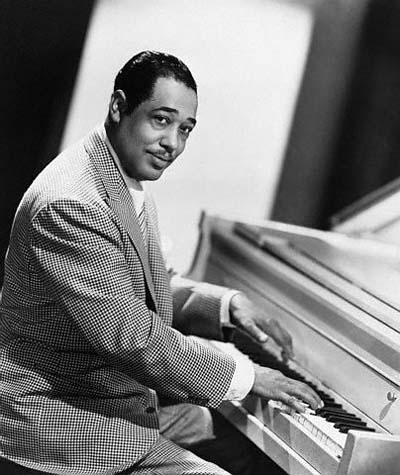
Here’s the pianist who I most credit, through his writing and playing (and the brilliant writing and arranging of Billy Strayhorn) with really putting “jazz” music on the harmonic footing it’s been on ever since. A lot of what Duke Ellington and Billy Strayhorn did utilized tools that had been used before, some all the way back to Bach (a II-V progression, for example), but in their hands it reached its ultimate expression as a very particular sound, an instantly recognizable jazz sound.
And to hear Duke play piano is a true study in orchestration.
One of the great poignant tracks in all of jazz, to me, is the version of “In a Sentimental Mood” played by Duke and John Coltrane on the CD Duke Ellington and John Coltrane. A very reserved, almost existential reading of that tune, with Duke playing his classic counterpoint under the melody, something only a master orchestrator would think of. A little bit of weird intervals in there, rhythmic enough that it moves the tune along, and somehow looking backward in a poignant way. It’s not “comping” in the style of what most piano players would play under the tune, it’s really more of a “part” than an improvised thing.
And that’s a lot of Duke Ellington’s gift: his playing sounds iconic, very intentional, very composed even when he’s improvising. Duke Ellington was also instrumental in jazz being recognized as music for the concert stage on par with anything else that was being played in the great halls of the world.
Although in what I interpret as a sign of a “real” jazz musician, he didn’t refer to his own music as “Jazz” so much as he preferred to call it beyond category or “American Music” or some such. And he is spot on; especially once he hooked up with Billy Strayhorn, the music he wrote and played really worked without boundaries, the way jazz oughta be!
He maintained a uniquely swinging big band throughout his life that’s always a joy to listen to and is one of those pianists whose touch is recognizable instantly.
To me, though, one of his biggest legacies is the huge body of harmony he and Strayhorn left to the world. Listen to tunes like “In A Sentimental Mood”, “Sophisticated Lady” and “I Got It Bad”; the basic charts themselves are road maps to a bunch of great harmony, but the actual harmony in the orchestration of the arrangements contains a huge treasure trove of harmonic techniques that everybody’s still using today.
Keith Jarrett:
I could write volumes on this great genius, but it’s probably a lot quicker for someone who’s knew to this music to listen to the introduction to “All The Things You Are” from the trio CD Tribute, or maybe this version of “When You Wish Upon A Star”:
And understand that these are real one-offs; Keith Jarrett is one of the “jazziest” of jazz musicians in that he really refuses to play “licks” of any sort. The touch, the harmonic sense, the melodic threads, and the way that he plays truly polyphonically (each voice of his harmony moves melodically to the next voice in the next chord to a kind of shocking degree) are uniquely him.
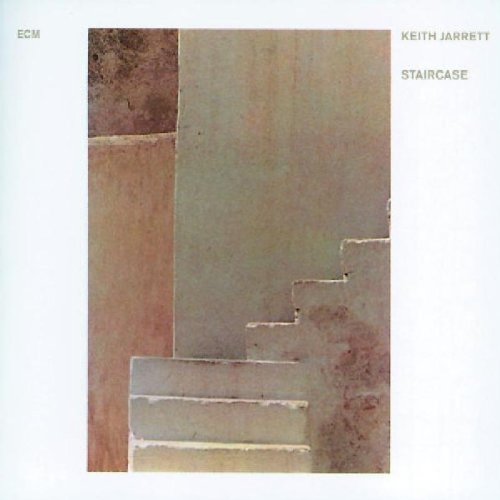 I first encountered Keith Jarrett’s music when I was 13 and my parents bought me Staircase, Hourglass, Sundial, Sand, which is still, after all these years, my favorite Keith record. It completely transcends any pigeon-holing, and it has so much of what I truly love about his playing. Take a listen to a cut like “Hourglass”, from this CD. NOBODY else could come up with something like this combination of gospel, Bela Bartok, the mercurial lines, the incredible wide dynamic range, and the way it rolls and grooves.
I first encountered Keith Jarrett’s music when I was 13 and my parents bought me Staircase, Hourglass, Sundial, Sand, which is still, after all these years, my favorite Keith record. It completely transcends any pigeon-holing, and it has so much of what I truly love about his playing. Take a listen to a cut like “Hourglass”, from this CD. NOBODY else could come up with something like this combination of gospel, Bela Bartok, the mercurial lines, the incredible wide dynamic range, and the way it rolls and grooves.
I got the laugh out of my life when the book Keith Jarrett: The Man and his Music appeared and I read the story of how this CD came about. Apparently Keith and Manfred Eicher were recording a bunch of contemporary classical music and they both remarked on what a great piano they had and how beautifully tuned it was (it really is something to hear, as evidenced on the CD), and Eicher said “Well, why don’t you just sit down and play something and we’ll record it”.
And that’s what this CD is, something that the guy sat down and played on the spur of the moment. Instantly recognizable just from the first note he touches on the piano, second to none in his ability to improvise impeccable harmony, with a beautiful fluid touch that mere mortals can only aspire to. And yes, there’s the singing, the grunting, the lecturing of the audience. I don’t notice it, I have to say.
If I had to have railroad spikes driven into my eye sockets to hear this music, I would assent to that and I don’t think I would notice that either. At his best, Keith Jarrett’s music is so deeply moving to me that I have to kind of prepare myself to hear it. And to me, that completely transcends everything else!
Bud Powell:
When I arrived at the Berklee College of Music in 1980, Bud Powell was my man. I had started with the Captain, from Captain and Tennille, then gone to Keyboard Magazine where Chick Corea, Herbie Hancock, Keith Jarrett, Les McCann, McCoy Tyner, George Duke and Lyle Mays sucked me in, then started working my way back.
How did these guys get to where THEY were? And that led back to Wynton Kelly, Bill Evans, Red Garland, Lennie Tristano, Oscar Peterson, and THAT led back to Bud Powell and Art Tatum.
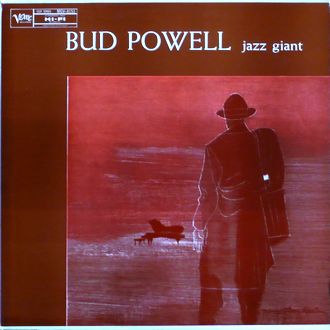 And I was just fascinated by Bud Powell’s lines and his weird, angular left hand (a lot of which came straight through to McCoy Tyner, I think…) by the time I got to Berklee. This, to me, is where the piano I like to play really sprang from the earth, the long, fascinating lines played with such drive and touch, and I just loved his writing as well.
And I was just fascinated by Bud Powell’s lines and his weird, angular left hand (a lot of which came straight through to McCoy Tyner, I think…) by the time I got to Berklee. This, to me, is where the piano I like to play really sprang from the earth, the long, fascinating lines played with such drive and touch, and I just loved his writing as well.
Check him on “Tempus Fugue-It”, from a CD called “Jazz Giant”, for starters. There’s so much on a track like this that the world had never heard before.
The next track is one of my favorite of Bud’s compositions, “Celia”:
There’s actually a ton of what is essentially “soul piano” on this track, some great grace notes, and a break that always reminded me of Charlie Parker’s famous break on “Cherokee”. The clarity of the thought on here is what really grabbed me, I think, as I struggled to figure out how the hell to make a nice solo in real time.
Bud Powell really got to the place where he could relax with the camera all the way pulled back: the mechanics were gonna take care of themselves, things were going to fall into place beautifully harmonically, the real question was just “what’s the melody going to be”? He’s also laying back so great against the time; I love the extra weight he adds to various parts of his phrases by really letting some notes fall way behind the beat.
Jazz piano would not be what it is today without this beacon of what was possible playing bebop piano. And his fellow pianists agreed; check the long list of testimonials from a pretty disparate group of pianists here. I especially love Herbie’s quote: “Every jazz pianist since Bud either came through him or is deliberately attempting to get away from playing like him.”
And here is a little fun fact: McCoy Tyner was inspired by Bud Powell and got to hang with him as a kid; Bud was a neighbor, and McCoy’s mom, a beautician, used to cut Bud’s hair...
George Duke:
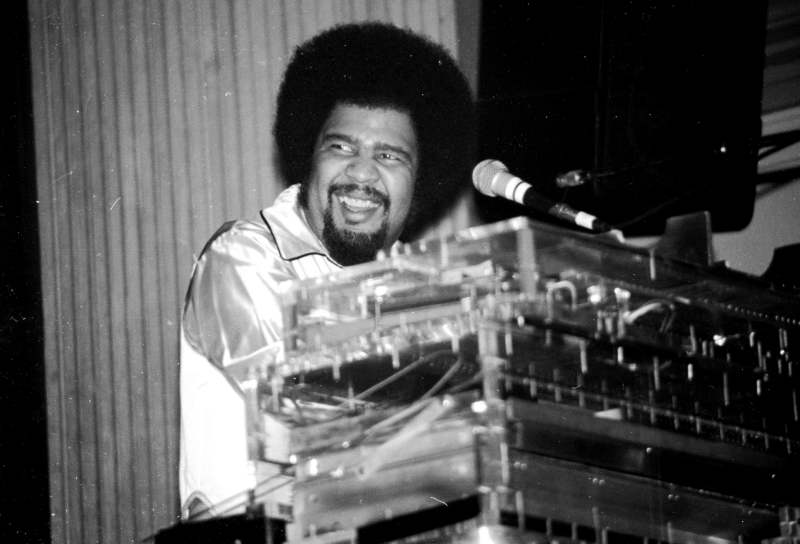
This is my little addition mostly because this guy sets a real standard with the incredibly soulful way he played everything from MiniMoog to Rhodes to piano to <gasp!> trombone.
George Duke started out as a trombonist (he even has a Bachelor’s degree on trombone and composition), but pretty quickly adapted to piano and keyboards; I remember reading a story about him playing with Frank Zappa’s band: Zappa shows up and plops a MiniMoog down on his Rhodes and says “you should get into this”, and according to George, he and the Moog kind of circled each other warily for a month or so.
But if there were ever a match made in heaven, it’s George Duke and the synthesizer. In his hands it’s just amazingly expressive, no touch sensitivity be damned.
I think there are very few piano/keyboard players who have ever milked the TIME the way George Duke does. It’s unbelievably elastic; he’s never just sitting in the pocket cranking it out, but everything is instead just so inflected and so colored by where he’s putting it in space, in relation to the beat. And the phrasing is a true “touched-by-God” thing.
I bought a record of his called I Love The Blues, She Heard Me Cry in the little record shop in my hometown in Oregon for $1.99. I had just about $2, and this was in the cutout bin, and I kept reading about George Duke, George Duke, George Duke in Keyboard magazine. And that record just changed my life, I gotta say.
Check George’s Rhodes solo on a tune called “Sister Serene” from this record for a classic example of his absolutely soulful playing (lots of great George-only Minimoog stuff on this tune as well).
Reminds me somewhat of the incredible restraint and soul-only solo Herbie Hancock takes on “Butterfly”, in fact. Just a few notes (and in the subsequent fills), but perfection on a groove. And definitely check out the YouTubes of him playing with Zappa; for somebody who was reluctant to get into the synthesizer, he sure got all the way into it!
Related Blogs:
- George Whitty on Influential Jazz Piano Players: Part 1
- George Whitty on Influential Jazz Piano Players: Part 2
- Jazz Piano Lessons with George Whitty Coming Soon
Learn Jazz Piano Online with George Whitty at http://artistworks.com/jazz-piano







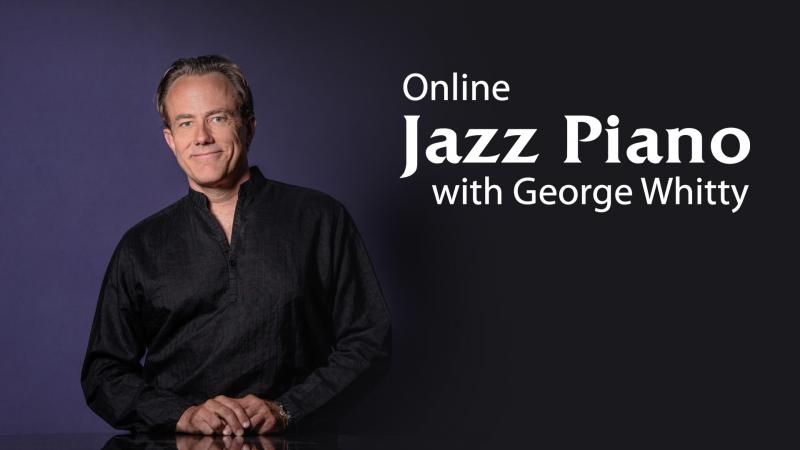
Comments